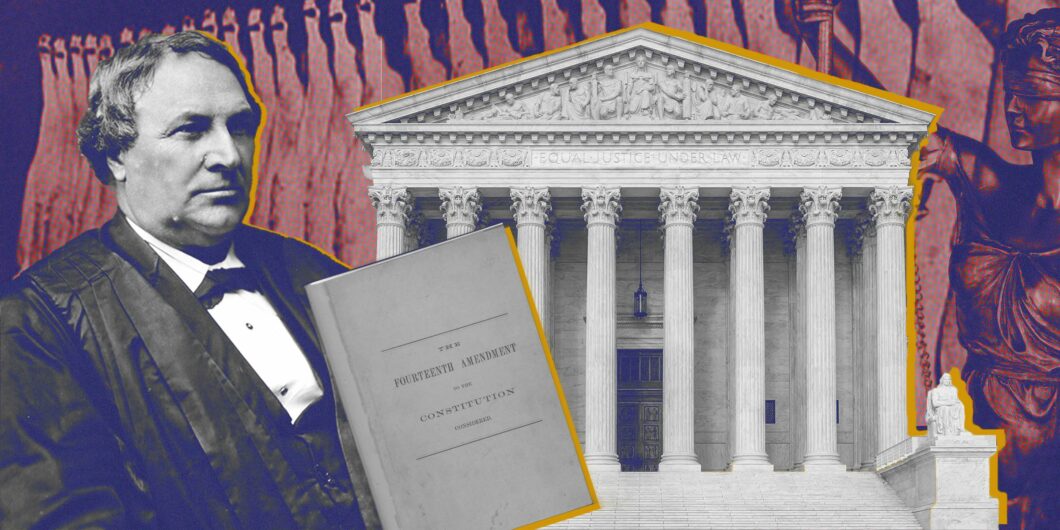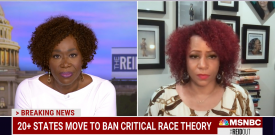Critical Race Theory has taken over our lives to such a degree that ordinary Americans are rising to say basta—enough!
Long Live Formalism
In their thoughtful responses to my lead essay, Evan Bernick, James Rogers, and Allen Mendenhall do not challenge my reading or historical account of the Privileges or Immunities Clause, according to which the clause would be an equality provision that cannot provide support for the incorporation of the Bill of Rights. Instead, they make a number of orthogonal, albeit important and interesting, points—whether conservatives should want to revive the clause, whether my methodology is consistent with modern originalism, whether the Slaughter-House Cases would have come out the same way anyway, and whether the reconstruction amendments are even validly ratified.
Let me start with Bernick, who does raise issues that might cast doubt on my interpretation of the Privileges or Immunities Clause. In response to my claim that the clause was intended to constitutionalize the Civil Rights Act of 1866, Bernick correctly points out that many (if not most) Republicans believed that the Act was already constitutional under the Thirteenth Amendment. But that does not answer the problem raised by James Garfield and others: that even if the Act were authorized by the Thirteenth Amendment, nothing would prevent future Congresses from repealing it.
More to the point, however, this claim about the Thirteenth Amendment provides further support for my reading of the Privileges or Immunities Clause. That is because no one thought the Thirteenth Amendment incorporated the Bill of Rights against the states. No one thought the abolition of slavery meant that federalism was also abolished and that Congress could define contract and property rights in all the states. All it meant, even under the Republican view, was that the formerly enslaved were now citizens and that Congress could compel the states to treat those citizens equally with their white citizens. Of course, that broad reading of the Thirteenth Amendment that authorized the Civil Rights Act (which insisted on this equality) did not have universal support, did not obviously follow from the text, and did not solve the problem of future Congresses repealing any enforcement legislation. Hence the Fourteenth Amendment was necessary, and in this sense did much more than merely “confirm” the constitutionality of the Civil Rights Act. It secured it against all counterarguments and against future repeal.
Both Bernick and Rogers argue that even if I am right about the Privileges or Immunities Clause, the Slaughter-House Cases themselves would still come out the same way. That is because, to quote Rogers quoting the Slaughter-House majority, both Parliament “and the legislative bodies of this country, have from time immemorial to the present day, continued to grant to persons and corporations exclusive privileges—privileges denied to other citizens—privileges which come within any just definition of the word monopoly,” and this power “has never been questioned or denied.” The problem is, if the majority had taken seriously the text of the Privileges or Immunities Clause, it would then have raised the question of whether that clause placed new limitations on this historic power to treat citizens unequally.
There is reason to think that monopolies were the quintessential examples of abridgments. Several state constitutions enacted “equal privileges or immunities” clauses in the antebellum period, and the drafters made clear these were specifically about corporate monopolies. To take but one example, Indiana’s constitution of 1851 provided: “The General Assembly shall not grant to any citizen, or class of citizens, privileges or immunities which, upon the same terms, shall not equally belong to all citizens.” There was some debate on this clause, and its sponsor stated that it “destroys the monopoly principle . . . .” Another delegate to the state constitutional convention explained that “the proposition is a plain one, that there shall be no exclusive monopolies—no privileges granted to one man which shall not, under the same circumstances, belong to all men.” Yet another observed of the proposal that “[i]f [the legislature] grant a privilege to a corporation, they shall grant the same privilege to all other persons who ask for the privilege.” And the year before the Fourteenth Amendment was adopted, in a case cited by the Slaughter-House dissenters, the Illinois Supreme Court held that the creation of slaughtering monopolies was beyond the police powers of municipalities because not reasonably calculated for any health or safety benefits. Whether that’s right or wrong, at least the Privileges or Immunities Clause allows us to analyze the question correctly.
Both Bernick and Rogers also take issue—or ask questions about—my claim that the Privileges or Immunities Clause would more vigorously protect economic liberties. Rogers explains that economic liberties are already protected by the Fourteenth Amendment and migrating that protection over to the Privileges or Immunities Clause does not tell us why the standard of review would be different. Although I was not clear about this in my initial essay, one advantage of migrating to Privileges or Immunities is that we know that economic liberties were the core of these privileges, and so it would take some real ingenuity to say that they deserved a lesser degree of scrutiny. That does help advance the ball for economic liberties. I do think in this respect I also agree with Bernick and his co-author, Randy Barnett, that some kind of rationality review is appropriate, but not the any-conceivable-basis test. I welcome Bernick’s invitation to sit at their table, as long as this rationality review is applied only when there is a plausible case of discrimination.
Let me say one more thing about Rogers’ response. He says my originalism—which he claims focuses on the “intentions” and “expectations” of the drafters—has more in common with the majority in Slaughter-House that also focused on the “public purposes” of the amendments, than with modern originalists who focus on original “meaning” or “textualism.” I confess I don’t see the difference. Of course, if by “original intent” we mean that the secret intent of the drafters can override the meaning of the text, then we should, by all means, reject original intent. But I don’t know any originalist who thinks like that (and I certainly don’t). But when the text itself can carry more than one possible meaning, no one disputes that the historical record, the intent of the drafters, and the public purposes of a law are important indicators of which meaning is correct. That is all I purported to investigate with my historical analysis.
When the text itself can carry more than one possible meaning, no one disputes that the historical record, the intent of the drafters, and the public purposes of a law are important indicators of which meaning is correct. That is all I purported to investigate with my historical analysis.
As for Mendenhall’s critique, he lists several reasons to think that conservatives might (or should) oppose reviving the Privileges or Immunities Clause, including that we need “decentralization” and “[w]e shouldn’t do at the federal level what states could do themselves.” Here I can only emphasize that my equality-only reading of the Privileges or Immunities Clause is the most favorable to federalism, diversity, and experimentation than any alternative reading. Under the incorporation reading, the national bill of rights, as interpreted and in many cases mangled by the Supreme Court, is binding on all fifty states. Barnett and Bernick’s incorporation-cum-unenumerated rights reading would nationalize even more. Under my reading, it is true that courts will have to distinguish between abridgments (invidious discriminations) and regulating the content of the right. But that analysis at least gives a chance for states to experiment.
Mendenhall does not deny any of this; rather, his point seems to be that conservatives ought to prefer none of these options, and ought to stick with reading the clause out of the Constitution altogether. Maybe so or maybe not, but I am an originalist and I care about the right historical answer. I have less to say (here, at least) about whether we should in fact adopt originalist readings as a normative matter.
I turn lastly to Mendenhall’s suggestion that if we are originalists all the way down, then perhaps the Fourteenth Amendment was not even properly enacted because it was adopted in Congress when the Southern representatives were denied representation and ratified by the people of the South at gunpoint. I am not an expert on this particular question—I do not discuss it in my book on Section One—but neither is Mendenhall, who “express[es] no judgment on the merits of [the] position” that he articulates and that he says has “attracted scholarly support.” It might behoove us, then, to rely on the scholarly account that purports to refute that position—namely, John Harrison’s 2001 paper The Lawfulness of the Reconstruction Amendments.
In short (and to give my own spin, with which Harrison may not entirely agree), I don’t see how the enactment was unlawful. As for ratification, that was more consistent with modern notions of popular sovereignty, anyway, since it was the freed people that largely participated in the ratification process. The trickier question is the adoption in Congress. Yet the Constitution grants Congress power to decide the “qualifications” of its own members, and at the time the Southern representatives were seeking admission, the Northern representatives were the only ones sitting in Congress—and they concluded that the Southerners who presented themselves were not “qualified” because their states were still effectively in open rebellion (Appomattox notwithstanding) and not republican in form, which was a requirement of the Republican Guaranty Clause. To give Southerners their seats would mean to increase their political power after they had been the ones to engage in rebellion because now their formerly enslaved citizens would count as full persons for purposes of representation.
I would ask Mendenhall, what, exactly, in the Constitution prohibits members of Congress from drawing such a conclusion? What limits their power to judge the qualifications of their members? What limits their judgment under the Republican Guaranty Clause? Chief Justice Taney in Luther v. Borden made clear that identifying the legitimate governments of the states was a political question for Congress. And here Congress decided that the so-called “representatives” were not the representatives of the true, republican governments in the South—because at present there weren’t any. And it was not until Congress organized republican governments under the reconstruction acts that there were governments that could validly ratify the amendment. This may seem overly formalistic to some. But if this is formalism, then, to quote someone famous, long live formalism.


